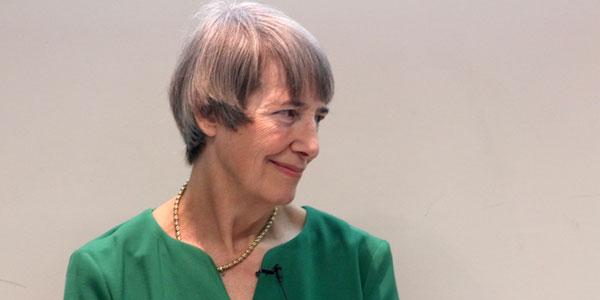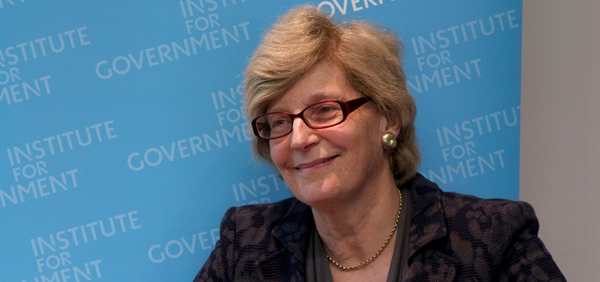Women and Whitehall
How did Whitehall change after 1979 – and what does that mean for its future?
Women are better represented in Whitehall than ever before, but the Civil Service still faces challenges, especially in improving the representation of women at the top of the Civil Service. Joe Devanny heard three distinguished former officials reflect on their career experiences and how Whitehall has changed.
The Civil Service “is not terribly good at remembering its history” and so can sometimes forget successful initiatives and fail to keep alive “things that worked” in its recent past. This is one of Alice Perkins’ reflections from the Institute’s recent panel discussion on Women and Whitehall.
Alice Perkins speaking at the event
The event was rich with stories and vivid recollections about what Whitehall was like in the 1970s and 1980s, and reflections on how Whitehall has changed over the last thirty-five years. Alice’s point about not forgetting the past is a premise of our wider work on the contemporary history of Whitehall and the value of history to officials. The panel discussion involved three distinguished former officials: Dame Valerie Strachan (Chair of the Board, Customs & Excise, 1993-2000, who joined the Civil Service in 1961), Alice Perkins (Director General, Cabinet Office, 2001-2005, who joined the Civil Service in 1971), and Lord O’Donnell (Cabinet Secretary, 2005-2011, who joined the Civil Service in 1979). Chaired by the Institute’s Jill Rutter, the discussion ranged over four decades of life in Whitehall.
‘Macho’ culture and perceptions of successful women
Dame Valerie spoke about the “macho” culture of HM Customs and Excise in the 1960s and how the sole senior woman in the department was always described as “formidable” – why were only successful women, and never men, described as “formidable”? From the audience, former DCMS permanent secretary Dame Sue Street hoped that women would not feel they needed to be “battle axes” to succeed.

Dame Valerie Strachan speaking at the event
Alice Perkins noted that she did recognise that being a woman could be a problem until she left the Department of Health and Social Services for the Treasury, while Margaret Aldred said that the Ministry of Defence she joined in 1975 was a place where “institutional sexism bordering on sexual harassment was the norm”, and that, even in later years, a woman had left the department because “she wanted to go and work somewhere where she was treated as ‘normal’”. Whitehall has improved “in leaps and bounds” over the years, but Aldred noted the danger that things could also move backwards. Lord O’Donnell noted that the feeling of being an outsider was not confined to women – he felt it at the Treasury when he joined as an economist without on Oxbridge background. Whitehall was sometimes not just ‘macho’ but also clueless: Kate Jenkins recalled “the importance of having women around”, when she had to convince a parliamentary counsel (and father of four) that pregnancy was 40 and not 36 weeks, whilst working on legislation for maternity leave!
Ministers and women
Jill Rutter asked about the role ministers played in advancing or inhibiting women, noting that there was sometimes reluctance to put women in private office jobs that were key to advancement – and ministers’ needs were often the rationale for long hours. Alice Perkins said that ministers could foster ‘family-friendly’ environments, singling out the “laid back” Ken Clarke, who did not chase officials for work late into the evening, contrasting him with Norman Fowler, who kept his officials late, sometimes for meetings that were ultimately cancelled. Dame Valerie said she had missed out on a job because one minister had not wanted a private secretary who was the mother of a young child. She also remembered that the department’s Establishments Officer had inquired, in considering Dame Valerie for the post, whether or not she was pretty. Lord O’Donnell argued that the gradual appearance of women ministers had been beneficial to Whitehall. John Major had been hamstrung by the lack of a pipeline of female ministers of state under Margaret Thatcher, but under New Labour women ministers began to make a difference. He said that Ruth Kelly’s refusal to take home a box of papers forced the department to realise that it was able to adjust to different working patterns.

Lord O'Donnell speaking at the event
Changes over time
When Dame Valerie joined the Civil Service in the 1960s, new mothers faced a stark choice: return to work full time after a few months of leave or else resign. Part time working was not yet a career option, but it did gradually become more regular and accepted over the course of Dame Valerie’s career. Both Alice Perkins and Lord O’Donnell remembered that part time jobs had a poor reputation in the 1970s and 1980s, as peripheral postings in backwater areas. But this improved over time, with Alice Perkins able to work part time and be promoted in the 1990s. From the audience, Ann Chant also stressed that “Whitehall” is not shorthand for the Civil Service: the majority of officials work outside Whitehall. She also praised the Civil Service for offering unparalleled career opportunities to non-graduates like her. Senior women faced more scrutiny in the past: Dame Valerie recalled the level of media interest in her as a senior woman official in the 1990s, lamenting press coverage of her dress sense and the likely effect of such close scrutiny in deterring women’s aspirations for top jobs.
Asked to offer advice to Melanie Dawes, the Civil Service Gender Champion, Lord O’Donnell stressed the importance of passionate leadership from the top in improving diversity and establishing sustainable structures to embed and build on progress in bringing on talent. Dame Valerie emphasised the need for women to be highly visible senior leaders to show especially other women that women can do the top jobs, and also said that concern for gender diversity should not crowd out attention to ethnic, socio-economic and disability issues. Alice Perkins ended on a cautionary note, that successful initiatives like women’s networks, once established, risk being forgotten: “It can’t be assumed that because progress has been made and important things have been landed that they will then stay – people move on, things change.” Events like this one, with a historical focus, can be of value in helping the Whitehall of today to remember its past and thereby guard against risk of moving backwards.
- Topic
- Civil service
- Publisher
- Institute for Government
